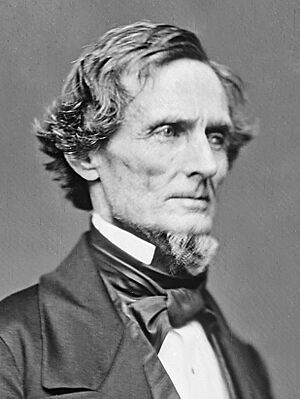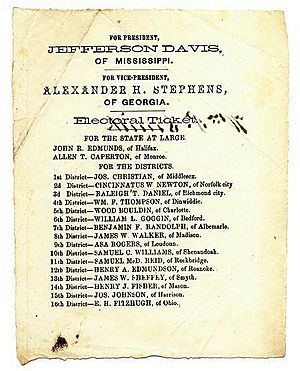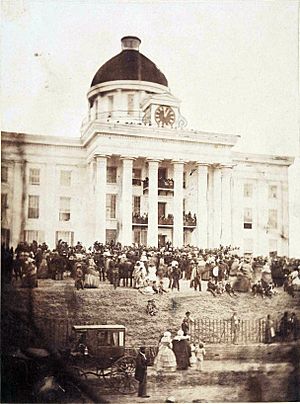President of the Confederate States of America facts for kids
Quick facts for kids President of theConfederate States |
|
|---|---|

Seal of the Confederate States
|
|
|
Only officeholder
Jefferson Davis February 18, 1861 – May 5, 1865 Provisional: February 18, 1861 – February 22, 1862 |
|
| Style | His Excellency |
| Residence |
|
| Seat |
|
| Appointer |
|
| Term length |
|
| Constituting instrument | Constitution of the Confederate States |
| Formation |
|
| First holder | Jefferson Davis |
| Final holder | Jefferson Davis |
| Abolished | May 5, 1865 |
| Salary | CS$25,000 per year |
The president of the Confederate States was the main leader of the Confederate States of America. This group of states broke away from the United States during the American Civil War. The president was in charge of the government and the military. This included leading the Confederate Army and Navy.
The rules for the president were set in the Constitution of the Confederate States. This document gave the president the power to carry out laws. The president also appointed important officials and made agreements with other countries. They could also forgive crimes and call or end meetings of the Congress in special situations.
The president was chosen by the people through a system called the Electoral College. They served a six-year term. Jefferson Davis was the only person to hold this position. He became president of the temporary government on February 18, 1861. Then, on February 22, 1862, he became president of the permanent government. He served until the Confederacy's military forces were defeated. The Confederate government officially ended on May 5, 1865. Davis was captured by the United States Cavalry a few days later.
Contents
What the President Could Do
The president of the Confederate States had powers similar to the president of the United States. The Confederate Constitution made the president the leader of the Army, Navy, and state militias. This was true when these forces were needed by the Confederate States.
Key Responsibilities
The president could also forgive people for crimes against the Confederate States. They could make treaties with other nations. The president also chose diplomats, judges, and other officials. These choices needed approval from the Confederate States Senate. The president could also remove these officials. If the Senate was not meeting, the president could fill empty positions. However, they could not reappoint someone the Senate had already rejected.
The president was also expected to give information to Congress. They would suggest new laws and welcome ambassadors from other countries. It was also their job to make sure federal laws were followed. Finally, they gave official ranks to all military and naval officers.
Special Powers
One power the Confederate President had, which was different from the U.S. President, was the line-item veto. This allowed the president to reject specific parts of a bill, not just the whole thing. This power is more common for state governors in the U.S. However, Jefferson Davis did not use this power before the war ended.
How the President Was Chosen
On February 9, 1861, the temporary Congress in Montgomery chose Jefferson Davis as president. They also chose Alexander H. Stephens as vice president. Stephens took his oath of office on February 11. Davis was sworn in on February 18 when he arrived from Mississippi. He had resigned from the U.S. Senate before this.
Confederate presidents were meant to serve only one term. Davis and Stephens were officially elected on November 6, 1861. They were chosen for six-year terms, as stated in the permanent constitution. The capital city moved to Richmond in June 1861. The inauguration for their permanent terms happened there on February 22, 1862. It took place at the Washington statue on Capitol Square.
The President's Oath
Before becoming president, Jefferson Davis had to take an oath. This was a promise to do his job well. The oath was:
I do solemnly swear (or affirm) that I will faithfully execute the office of President of the Confederate States, and will, to the best of my ability, preserve, protect, and defend the Constitution thereof.
President's Pay and Home
In 1861, the president of the Confederate States earned $25,000 each year. This was in Confederate dollars. They also received money for expenses and travel that was not taxed. The president's main office was on the second floor of the Custom House on Main Street. This building also held the Cabinet Room and other government departments.
The city of Richmond bought a house called the White House of the Confederacy for the president to live in. Davis did not accept it as a gift, but the house was rented for his use. People called it the "White House of the Confederacy" or the "Grey House." Davis lived there until Union forces took Richmond in April 1865. Later, this house became a museum for historical items and documents. In 1896, it was renamed the Confederate Museum.
President's Staff
By 1864, President Davis had a private secretary named Burton N. Harrison. He also had five military assistants, called aides-de-camp. These included Col. William M. Browne, Col. James Chestnut, Col. William P. Johnston, Col. G. W. C. Lee, and Col. John T. Wood.
See also
 In Spanish: Presidente de los Estados Confederados para niños
In Spanish: Presidente de los Estados Confederados para niños
 | Charles R. Drew |
 | Benjamin Banneker |
 | Jane C. Wright |
 | Roger Arliner Young |




